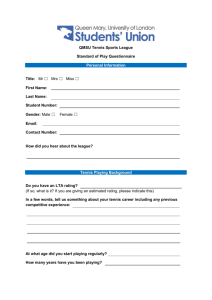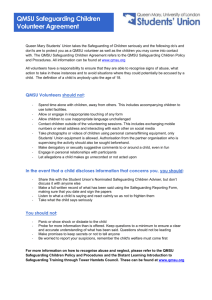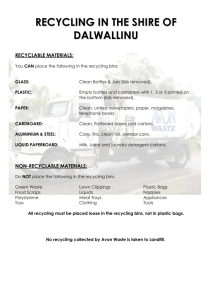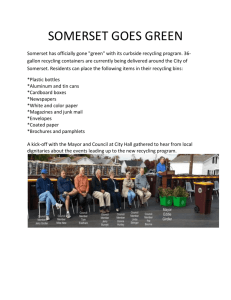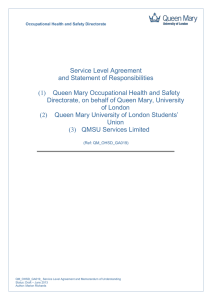QMSU Strategic Plan - Queen Mary Students` Union
advertisement
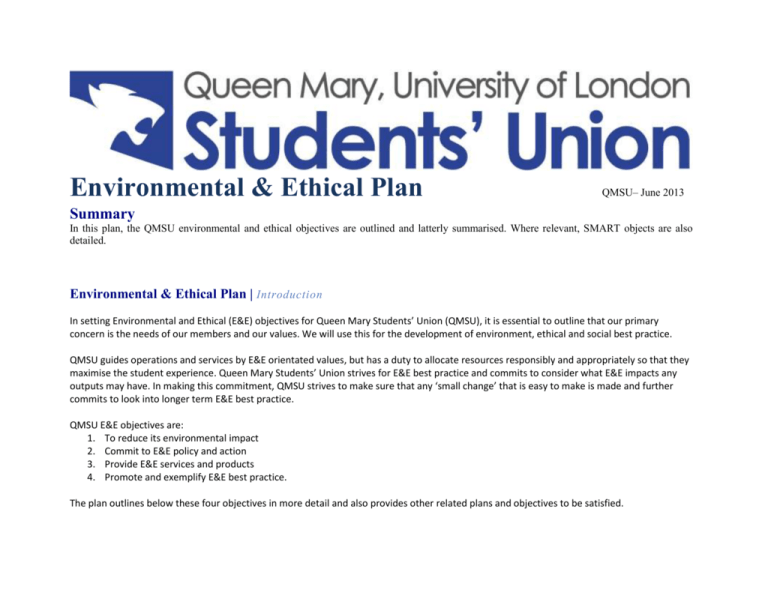
Environmental & Ethical Plan QMSU– June 2013 Summary In this plan, the QMSU environmental and ethical objectives are outlined and latterly summarised. Where relevant, SMART objects are also detailed. Environmental & Ethical Plan | Introduction In setting Environmental and Ethical (E&E) objectives for Queen Mary Students’ Union (QMSU), it is essential to outline that our primary concern is the needs of our members and our values. We will use this for the development of environment, ethical and social best practice. QMSU guides operations and services by E&E orientated values, but has a duty to allocate resources responsibly and appropriately so that they maximise the student experience. Queen Mary Students’ Union strives for E&E best practice and commits to consider what E&E impacts any outputs may have. In making this commitment, QMSU strives to make sure that any ‘small change’ that is easy to make is made and further commits to look into longer term E&E best practice. QMSU E&E objectives are: 1. To reduce its environmental impact 2. Commit to E&E policy and action 3. Provide E&E services and products 4. Promote and exemplify E&E best practice. The plan outlines below these four objectives in more detail and also provides other related plans and objectives to be satisfied. QMSU E&E Plan Objective 1: To reduce our environmental impact As the pinnacle of QMSU Environmental and Ethical (E&E) policies and plans, QMSU aims to have as little negative impact on its surrounding environment as possible. QMSU further seeks to improve this environment where possible through student led initiatives. Firstly, QMSU will ensure that its consumption of energy is efficient and necessary. Heating is managed through central systems (estates) to ensure that there is appropriate regulation. There shall be responsibility on individuals to manage their own spaces and their actions. Staff and officers will be inducted into electrical equipment shut down processes and made aware of the waste involved in leaving unnecessary equipment on. QMSU shall measure and manage initiatives to increase electrical, heat and water consumption efficiencies on a regular basis. Transport is identified as a significant contribution to QMSU environmental footprint. Efforts will always be made to use the most efficient means of transport and as such the hierarchy of travelling by train, bus, coach, car and plane as a last resort shall be endorsed by staff. Staff members who use transport to get to work are offered environmental solutions such as places to store bikes, shower and changing facilities or alternative loan schemes to purchase annual public transport passes through QMUL scheme. QMSU has a commitment to reducing the amount of waste it sends to landfill. There is a significant commitment to ensure that there is efficient recycling of all recyclates possible. There shall be recycling of office grade paper in all offices and then further recycling schemes for other materials such as aluminium cans, PET plastics, Page 2 HDPE plastics, batteries, ink and old mobile phones. These shall be recycled through local government schemes or other charity organisations. Objective 2: Commit to E&E policy and action Setting and planning E&E policy is essential for QMSU to be able to establish priorities and expectations and to latterly be able to devise means to measure these. The senior management team (SMT) shall regularly review all E&E policies. Policies set by students are a simple way for students to direct priorities for staff although it is expected of SMT to further interpret and devise their own internal policies. The E&E policy shall be reviewed at least annually but working objectives set based on it measured more regularly either quarterly or twice annually. Students are invited to E&E working groups to give their input and to highlight issues they feel important to them as students. Staff, however, are the drivers of the actions and will be responsible for delivering objectives and plans and ultimately being the stakeholders who supply QMSU’s most prominent positive action on the environment. SMT will largely be responsible for liaising with the Sabbatical team, members of the Green Mary group or any other appropriate student champion to advise them on updates or new working actions to receive student comments. Policy shall be drawn up as a collaborative process championed by students and delivered by staff. Drawing up E&E plans and policies, QMSU shall encourage and endorse innovative thought and will not be afraid to try or pilot new initiatives for which resources allow. QMSU E&E Plan Objective 4: Promote and exemplify E&E best Objective 3: Provide E&E services and products practice. Where there shall be purchase of materials and equipment, QMSU shall follow a purchase policy, which is environmentally and ethically sound. QMSU will at minimum purchase fair trade products for retail and complimentary food stuffs, fair trade staff uniforms where these are required and further seek to buy free range standard animal products from local (or at least UK sources) rather than intensively farmed products (home or abroad). QMSU will buy non-virgin materials when redeveloping property and in furnishing offices and social areas. QMSU will demonstrate best practice as a core working principle to all commercial services. Retail and catering outlets, bars and the health and fitness centre shall all operate as model social enterprises and as such demonstrate three key factors to consider in operations: social, environmental and financial values. Students shall benefit from these services socially in being the most predominant customers and staff. Students shall be provided the services in line with the demands they make. In staffing these operations, students would not only benefit financially, but would also learn skills and work experience. benefit themselves financially but also by building working skills through employment. All gross profit from commercial services shall be reinvested into the membership services. The costs of goods on site shall be further approved by the CEO on behalf of the students; the costs ultimately reflecting the value of the products. Lastly, commercial services will all promote healthy living as part of an E&E agenda. They shall all provide healthy options, value ethically correct purchasing and be models of best E&E practice. Page 3 In an education environment, QMSU feels it is equally important to adhere to E&E best practice but also to encourage its members. It is important that stakeholders are aware of environmental issues and also that they feel confident that their local environment is not detrimental to the wider areas. QMSU supports and encourages students to run campaigns promoting E&E issues. This could include raising awareness of current issues, such as combating climate change, or alternatively lobbying a body or institution for an improvement. QMSU has a regulatory role within the College and represents student opinions to relevant bodies, for example, students pledging for ethical investment and campaigning for fair-trade status. To feel confident of its current efficiency and compliance with policy, QMSU is proud to annually be a part of the NUSSL and QMUL Green Impact Awards. With a successful history in awards of this programme, QMSU values the audit and advise NUSSL & QMUL provide. Other examples of best practice include smaller initiatives such as: SMT ensuring that all refurbishments and developments are of a sustainable nature; Volunteering projects for students to get actively involved in improving the environment e.g. cleaning up local canals; Adherence to the waste hierarchy: Eliminate Reduce Re-use Recycle Dispose. QMSU E&E Plan Duty of Care | Outline N.B. This is not advice for compliance to legislation; it is guidance towards best pract ice. QMSU, particularly as a commercial entity, has a duty of care to its membership, to stakeholders and to the environment to satisfy some basic principles. Duty of Care Area Measure Noise 1. Any evening events shall hold relevant licences to play music 2. Efforts are made not disrupt local residents Waste Management 1. All waste sent to landfill will be weighed before & Disposal transporting. Efforts are made to reduce total waste by compacting. 2. Paper/battery/can recycling is in operation at all sites as a minimum 3. Recycling of plastics, aluminium and other recyclates is in operation where viable 4. Recycling of glass from bars is in operation Provision of Bins 1. Bins have be provided in all areas where disposable packaging is sold 2. Bins are provided in all working areas 3. Paper and/or recycling bins are provided to all office staff Hazardous Materials 1. All fluorescent light tubes are collected by a certified organisation 2. Cooking oil is collected and disposed of by a certified organisation Waste Electronic & 1. Arrangements are made for retailers to collect waste Electrical Equipment stamped Electronic & Electrical equipment OR schemes are in place for staff or students to reuse waste equipment Page 4 Record Owner Status 1. Evidence of licences 2. No complaints Event, Venue Managers Facilities, Cleaning, Venue Managers Green 1. Statistics demonstrate reduction 2. Evidence of operation Green/ Amber 3. Evidence of operation 4. Glass bins 1. See bins Facilities & Green Admin Manager 1. See designated collection sites and/or collection receipts Facilities & Green Estates Managers 1. See evidence of waste electronic or electrical equipment. Facilities, Marketing Managers Green QMSU E&E Plan Control of Substances 1. All staff expected to use such substances are trained 1. Staff training log Hazardous to Health and educated into the hazards and how to clean up spillages 2. There are clear signs to notify staff of the presence of 2. Evidence of signs hazardous materials Environmental SMART Objectives | | Facilities, Green Cleaning and Venue Managers Protecting and preserving the wider environment Reducing organizational impact on climate change Objective Measure & Record Energy Consumption Staff are all instructed to turn all lights and computers off when not in Work shut down policies use and to turn off equipment at the sockets to prevent residual loss over long periods of time (e.g. holiday) All heating of large areas (offices and public areas) is managed centrally Thermostats or other heating and set to 18oC. Heating and air conditioning is off outside of office management systems are in use. hours. Computers, lights and wall sockets are marked with energy saving Energy saving stickers are on computers stickers. and lights to ensure that they are switched off out of office hours Equipment such as automatic urinal flushers, water percussion taps and We use water saving devices and we are cistern bricks are in use everywhere possible to reduce water compiling evidence in order to ensure consumption. Water consumption statistics are further monitored every these statistics are acted upon. quarter to assess efficiency and identify areas for new initiatives All light fittings will be replaced with the most efficient options All newly fitted lights adhere to lighting available. Where there are plans for refurbishment, the hierarchy of hierarchy. lights to be used is LEDs, Fluorescent tubes (with mirrored fittings), energy saving light bulbs. Tungsten and halogen lights are avoided unless necessary. Discourage students and staff from using lift Poster to discourage lift usage. Page 5 Owner Status All Managers Green QMUL Environme ntal Manager Facilities manager Green Facilities, Estates Manager Green Facilities, Estates Manager Green Facilities Manager Green Green QMSU E&E Plan All kitchen equipment is (certified) energy efficient and where possible All equipment has energy efficiency put on timer switches so that it is turned off when not needed. certificates and timer switches are in use. Transport Students are encouraged to adopt a transport hierarchy for travelling to Coaches are provided to students where events (such as sports games, entertainments etc), which is to go by appropriate and incentive schemes for train, by bus, by coach, by car and lastly only if necessary by plane. public transport are offered. Facilities & Amber Admin Manager Sports Green Club Coordinator Travel by car is actively discouraged unless the car use is also for Changing facilities or transport loan transport of goods or materials. Staff members are encouraged to walk, schemes are in use. cycle or take public transport to work and as such changing facilities and public transport loan schemes are offered. Facilities, HR Manager Where staff have unexpected travel outside of travel to work, this is A log is reviewed by SMT who can recorded in a log so that all means of transport are reviewed and the recommend best transport options for most efficient methods can be identified for the future. future travel. CEO Where possible, local goods such as food products will be sourced from Local goods are used in catering or local suppliers. other areas. Where possible, to reduce the number of deliveries, goods should be Few retailers are used, purchase orders delivered in bulk and from as few retailers as possible. used to demonstrate. Recycling & Waste Management (as per duty of care) All waste sent to landfill will be weighed before transporting. Efforts are Monitoring of statistics of waste. made to reduce total waste. Paper recycling is in operation at all sites as a minimum. Paper bins in use. Recycling of plastics, aluminium and other recyclates is in operation Recycling bins in use. Page 6 Green & Green Director of Operations and Services Director of Operations and Services Retail Manager Director of Operations and Services Amber Green Facilities Manager Amber Facilities Manager Facilities Green Green QMSU E&E Plan where viable. Manager Recycling and collection schemes of unique recyclates through Evidence of campaigns for collection of campaigns (e.g. collecting old phones, stamps etc for charity) materials Facilities Manager Green Reduction of waste print cartridges through recycling and/or refilling Facilities Manager Catering/ Retail Manager Venue Managers Green Facilities Manager Green To reduce the amount of paper used, only required amounts of media There are no boxes of excessive publication (e.g. paper & flyers) are purchased publications around offices Marketing Manager Amber To reduce amount of material printed, online or electronic distribution Online alternatives to all media are of media is favoured over printed material available and distributed IPAD’s and Laptops are available for meetings Student Green Voice & Dev. Manager CEO & Amber Cafes and Shop’s promoting use of own mug to reduce waste Empty cartridges are collected for recycling or refilling. Posters promoting use of own mug Recycling of glass from bars is in operation Glass bins in use Considered Purchase To reduce the impact on deforestation, 100% recycled paper is bought Recycled paper is used in printers and in preference to regular paper notepads Purchase of non-virgin materials and specifically wood are bought Furniture and construction materials are where available to reduce unnecessary consumption of virgin materials certified by relevant commission Work in collaboration with Bookshop to promote recycling old text Promote recycling on Union screens books. Reusable, or at least biodegradable crockery, cutlery and glasses are Shops and catering outlets supply either distributed in preference disposable plastics or paper are used to biodegradable or reusable crockery etc further reduce unnecessary waste Page 7 Green Green Director of Operations and Services Marketing Manager Retail/ Catering Managers Green Green QMSU E&E Plan Appendix I: Summary of Environmental and Ethical objectives for QMSU Page 8 QMSU E&E Plan Appendix II: QMSU approved E & E Working Values 1. Protecting the quality of the land, air and water. 2. Carrying out an environmental audit and ensuring it is reviewed every one to three years. 3. Ethical investment, banking and purchasing, which does not involve companies who have links to unethical practices such as arms trading, third world oppression, production of tobacco products and animal testing. 4. Recognising the consequences and impact of our actions and services. 5. Allowing its students and staff consumer choice through labelling of goods which are unethical in some manner. For example G.M foods, third world oppression, unethical investment, fair trade and the distance goods have travelled. 6. Using recycled or green products wherever possible. (I.e. paper, cleaning materials), and continually searching for more environmental alternatives. 7. Reducing the production of waste. 8. Cutting down on the amount of disposable products used. (i.e.: plastic cutlery and crockery, glasses, unnecessary photo-copying and printing.) 9. Reusing where possible. (I.e. scrap paper, envelopes, crockery, glasses.) 10. Considering the ethical and environmental implications of any policy or decision and weighing this against the gains. (I.e. Promotion and advertising; is it really expedient to use hundreds of flyers/posters when recruiting for a limited number of people. Does that plastic bag/packaging really need to be used) 11. Increasing the standard of all waste being recycling in the next five years. 12. Moving towards use of greener types of energy. 13. Disposing of waste in the most environmentally responsible way possible. Page 9 14. Promotion of environmental and ethical concerns and ecological challenges we face (i.e. supporting Road traffic Act) and the nonpromotion of issues which are detrimental to this. (I.e. smoking, cars.) 15. Raising awareness of these issues to our members through campaigns and demonstration of best practice. 16. Considering the environmental implications of any building design/work/refurbishment. (E.g.; energy efficiency, insulation, energy sources, avoiding using detrimental materials) 17. Considering the green alternative in any policy, which is also usually more financially sound and has increased sustainability. 18. Ensuring the areas surrounding are as green as possible (with foliage), and avoiding building on the green we have left. 19. Interacting with other Student Union’s and national organisations on the issues we face, and supporting their campaigns. 20. Encouraging and protecting environmental education to be incorporated into academic courses. 21. Complying with all National and EU environmental laws. 22. Publication of all environmental assessments, reviews and findings. 23. Ensuring funding and resources for environmental concerns. 24. Applying pressure on the University to adopt and comply with an environmental policy. 25. Reviewing our environmental policy and performance annually. 26. Campaigning for environmental change at local and national level. 27. Ensuring that all staff and the Executive have ethical and environmental training and thus acquire the skills to take environmental concerns into consideration. 28. Pursuing compatibility with the Carbon Trust through assisting and encouraging the College to do also. QMSU E&E Plan Appendix III: Environmental Policy (Used to guide objectives) Electricity Reduce lighting where possible. Turn off lights in unoccupied areas, install censored light where possible, report flickering or broken lights, and turn off signage put up on other lights not necessary for security and safety. Turn off signage on all equipment to power down when not in use. Turn off printers, copiers, computers and monitors nightly and on weekends if they aren't needed. Don't be fooled by thinking screensavers save energy; they only prevent the screen image from burning in. Staffs are encouraged to shut down PCs that will not be used for more than one hour. All monitors should be set to go onto standby after 10 minutes, and staff should be instructed not to change the settings. Instead of lighting the whole office, use more localised 'task lighting' by lighting only the working area (e.g. desk lamps). A common wasteful practice is having lights on next to windows. If possible, switch off lights, or rows of lights, parallel to, or under windows/skylights. Before going on holiday, switch your computer off at the plug to prevent residual background electrical leakage. Heating Doors and windows should always be shut if heating systems are on. Radiators should be kept clear and unobstructed. Furniture in front of radiators will lead to warm furniture and cold staff! Portable electric heaters are inefficient and expensive to run. They also influence existing thermostats and heating systems, exacerbating any heating problems. If an area is cold, there is a heating problem that needs fixing ASAP. Paper All PC's should be set to both side prints by default. Everyone should 'Print Preview' before printing. Where possible, it is preferable to reduce the number of printers by sharing via networks. We use the photocopier that is networked to all PCs - that way we can print two-sided as default. All staff encouraged to use their own ceramic mug which can be stored in the pantry. Page 10 Where applicable, use whiteboards in offices to reduce the use of post-it notes. Don't over-order publications (flyers, SU newspapers) simply because it is cheaper to order bigger quantities. Take into consideration the environmental cost and only order the amount you know you will require. Alternatively, consider employing students to deliver the publications around the residencies. Ensure that you are recycling white paper in the recycling bins provided. Ensure that all photocopying is doubled sided where possible with long documents and meeting papers printed booklet format (A5) except for staff members with visibility difficulties or use IPAD for meetings documents. Envelopes: All staff should re-use used large envelopes and padded 'Jiffy' bags that arrive as mail. Standard re-use labels can be bought from stationers or have your own re-use labels printed. Either way, reusing envelopes will reduce the amount sent to landfill and reduce stationary costs, saving around £20 per year. Glass Ensure that all glasses in the bar are recycled in the bins provided and according to the operational guidelines provided by the Venue Manager. Transport Remember the transport hierarchy: In order of least environmental impact, it is Walk, Cycle, Train, Bus, Car-share, Car, Plane. When possible and if you are discussing issues with colleagues across the country, use the Video conference for meetings rather than travelling. Misc. All new staff should be introduced to this environmental policy as part of their induction. By following the steps of the staff environmental policy, staff and officers are showing an ongoing commitment to reduce energy waste in the Union and are furthering the aims of the organisation by conducting their work life in an environmentally friendly manner.
